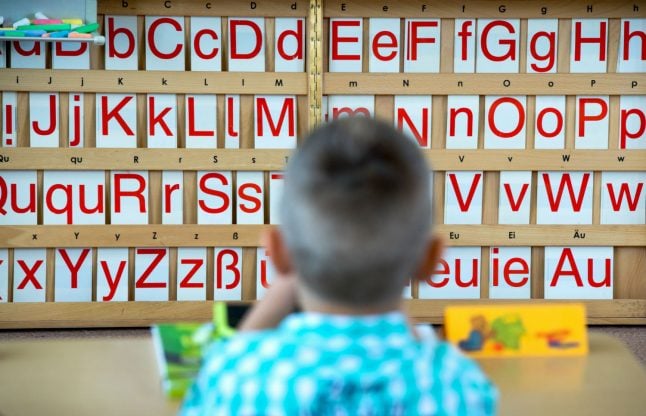When Carsten Linnemann, deputy chairman of Chancellor Angela Merkel’s Christian Democratic Union (CDU) parliamentary group, spoke out in favour of postponing the enrolment of migrant children at primary school who do not speak German well enough, there was a huge reaction.
It spurred a nationwide debate and – comments from The Local readers show how heated the topic is.
From people questioning why a politician wants to keep children out of education to some agreeing that youngsters need a higher standard of language skills before progressing into the school system, the comments split opinion.
International families in Germany also told of their own experiences of sending children to school without fluent language skills.
“To put it in a nutshell: a child who barely speaks and understands German has no place yet in a primary school,” Linnemann told German daily the Rheinische Post in an interview published on Tuesday.
READ ALSO: Children who don't speak Germany 'shouldn't be allowed to start school'
He said introducing children to school without sufficient language skills had a negative effect on German-speaking classmates and impacted the quality of education.
Linnemann stood by his comments but emphasized that he did not want to see children banned from primary school, as some media outlets had reported on Tuesday. He instead thinks the option of compulsory preschool education should be extended if youngsters need more time to improve their German skills.
'The best place for kids to learn German is school'
On The Local Germany's Facebook page Vidiya Heucken said: “I do not agree with this since the best place for kids to learn German is in school with daily interaction with German speaking kids. My son hardly did at first then, less than three months in, he spoke perfect German.”
“I strongly disagree with this politician,” said Ens Sinfuego, who added that her family came to Germany last year with “zero knowledge” of German but her children have gone on to excel in local schools.
Louise Palmer spoke of her husband's experience in a German school. She said: “My husband lived in Germany for a couple of years as a small child. He was put into a German school speaking no German at all but after a couple of months he was fluent.”
In another Facebook comment, Peter Sewell told how migrant children unfamiliar with German take part in special classes at school to improve their skills. “Expat kids currently do DAZS (German as a second language) classes at school before being integrated into regular classes,” he said. “My son loved it.”
 Carsten Linnemann. Photo: DPA
Carsten Linnemann. Photo: DPA
Kate, who moved to Germany from the UK five years ago, commented on yesterday's story to say that her two children have “done brilliantly” and both speak fluent German.
“Many people told us we would struggle but here we are, integrated, speaking German, working and enjoying life,” she said.
Is it a ploy to win back votes?
It’s not an exaggeration to say integration is a hugely sensitive topic in Germany, and there’s been a greater focus on it since Merkel's decision to accept an influx of refugees into the country in 2015.
Meanwhile, authorities repeatedly say Germany needs more immigration to fill jobs.
But with the rise of far-right movements, including the Alternative for Germany (AfD) party which entered the Bundestag in 2017 , anti-immigration rhetoric is never far away from the political agenda – or daily life.
Adding to the tension is the upcoming state elections in eastern Germany (September 1st in Brandenburg and Saxony) where the AfD is set to make huge gains and may even overtake the CDU.
It’s not surprising then that conservative politicians are trying to address integration issues perhaps in a bid to win back voters who are unhappy with Merkel’s policies and have drifted to the right.
Opposition politicians – and those from within his own party – accused Linnemann of playing this game.
Katja Kipping, boss of Germany's Left Party (die Linke), said Linnemann was bidding to get votes in the “right-wing swamp.”
Meanwhile, Karin Prien, CDU education minister in Schleswig-Holstein, described his comments on education as “populist nonsense”.
READ ALSO: Integration still received positively in Germany, according to study
'He can't have it both ways'
Members from the education community commented on Linnemann’s suggestion.
Linnemann “can’t have it both ways,” Dr Sandra Leaton Gray, associate professor in education at the University College London told The Local. “Either he wants families to buy into German integration or he doesn’t; keeping people segregated achieves nothing.”
Leaton Gray said within a school term children achieve “a good functional level of a second language after they have moved countries”.
“This applies to children of refugees as well as the children of relocating CEOs. Participating in mainstream schooling is an important step towards achieving this kind of fluency, as well as the necessary cultural integration.
“Keeping internationally mobile children out of school slows down second language learning as well as having a detrimental effect on societal integration in general.”
Instead of postponing school, Leaton Gray said Linnemann’s efforts “may be better spent encouraging a greater investment in German language instruction generally, as well as supporting the outstanding work of the Goethe Institute in this regard”.
'Every child has a right to study'
Other readers of The Local also weighed in with their views.
On our Facebook page, Makhnun Ila said: “This is unfair and ridiculous. Every child has a right to study.”
Lillian Barton said: “Kids should not be held back in school. It causes them not to want to go to school and drop out later on. It’s important that kids are with kids their own age group”
Cathy Carter also dismissed Linnemann's suggestions. “At the age of entering primary school, children learn a language very quickly,” she said. “It doesn't hold other children down at all and they will learn much quicker from their peers because they want to be accepted and join in the conversations.”
'It isn't fair to the class as a whole'
Some people said, however, they understood where Linnemann was coming from.
EXPLAINED: How each German state plans to improve childcare and lower Kita costs for families
M. Jason Long said: “I don’t think they should be prohibited from starting school, but there should be very intensive lessons held with other 'non speakers' to allow them to get up to par asap. It honestly isn’t fair to the class as a whole and the overall pace is definitely affected.
“Parents should be encouraged to enroll their young children in daycare and kindergarten as soon as possible to support the language education.”
Sigrid Entenmann added that having different levels of German in the same class “slows the other children down”.
“If they don't speak and understand German how can they learn?”
Meanwhile, Peter Mahaffey commented on our story yesterday to say that, on balance, it seems “sensible that a child should start being exposed to the new host country's language at the earliest opportunity”.
“And bearing in mind that German kids don't start official school until 5-6, then certainly they should have some exciting and imaginative language lessons well before that,” he said. adding that he thought Linnemann was “fundamentally on the right track”.



 Please whitelist us to continue reading.
Please whitelist us to continue reading.
I have a freind that is a school administrator in the US and at his school of about 350 students, there are children that speak over 30 different languages. That would obviously blow some people like Mr Linnemann’s mind if they had to figure out how to give all those children the education they need and deserve like we do in the US.